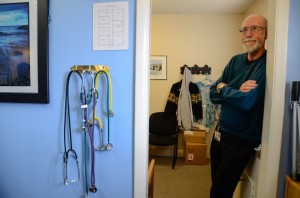“We’re very interested -- and very concerned – with how this is all going to work out,” said Bauermeister, executive director of the Free Clinic of Simi Valley, a California provider that seeks to keep immigrants out of expensive modes of care like the emergency room.
Obama’s commitment to move an estimated 11 million undocumented immigrants nationally “out of the shadows” would not end there. Under current law, it would also slowly open the door for them to qualify for public programs, including the health care overhaul’s massive coverage expansions.
Obama’s plan would have immigrants wait at least eight years before they qualify for health benefits. A Congressional plan spearheaded by Republican senators Marco Rubio and John McCain pushes the wait to at least 10 years.
Some experts believe both scenarios would create an interim period in which even wider gaps will develop between the haves and have-nots of health care.
If health reform works as intended, there will not only be a boost in the number of new people covered, but a steady improvement in their health. Meanwhile, undocumented immigrants sit on the sidelines for, give or take, at least a decade.
“We’re going to create a two-tiered system of health, as well as perpetuate disparities in health,” said Ignatious Bau, a San Francisco-based health policy consultant whose clients include insurance giant Kaiser Permanente.
“People who are in the system are going to get better quality and efficiency,” said Bau. “But [undocumented] people who aren’t in the system are going to go to the ER.”
The haves, incidentally, will continue to be stuck with the bill for the health care have-nots, Bau said.
There is a push by several groups, including the California Endowment, to win immediate health reform benefits for undocumented immigrants.
But so far neither President Obama, nor Congress, has shown any interest.
Some health providers believe that the gradual approach proposed by Washington is the only way to accommodate the undocumented population, particularly in immigrant-heavy states like California.
Health reform, which comes fully online in 2014, consists of two enormous coverage methods.
One is the Medicaid safety net, called Medi-Cal in California, from which undocumented immigrants are generally excluded.
The other is the government-subsidized insurance marketplace, Covered California, designed to help consumers find affordable health plans of their own choosing. Undocumented immigrants cannot participate in Covered California either.
The exclusions frustrate many health experts. They say that including currently ineligible immigrants in reform would slash the ranks of the uninsured.
According to a 2011 study by the UCLA Center for Health Policy Research, 84 percent of California’s 7 million uninsured will qualify for health reform coverage as it currently stands.
If undocumented immigrants were added to the health reform mix, 100 percent of the state’s uninsured would then be eligible for some form of coverage. Still, experts say, because of language barriers and personal choice, it is unlikely every qualified immigrant would apply.
Nationally, the Congressional Budget Office reported in 2010 that more than 90 percent of U.S. residents could eventually be insured with the boost provided by health reform, leaving about 23 million uncovered. If undocumented immigrants were granted coverage, the uninsured would be slashed by an additional third.
Health experts rarely dispute the long-term fiscal benefits of covering more people.
Studies like Health Care Reform in Transition, in the Journal of the American Medical Association, find the larger the population in an insurance pool, the more stable the premiums.
“The healthy subsidize the sick,” the 2010 study found.
Scholars also cite studies showing that immigrants are generally younger, and healthier, than the U.S.-born population when they first arrive. As they stay in the United States longer, their health begins to decline and look like that of their U.S.-born counterparts, studies find.
Nevertheless, Obama cites the Personal Responsibility and Work Opportunity Act of 1996, which bans green card holders from public benefits for five years, and his own ideas, as the timetable for immigrant access to health reform.
According to a leaked copy of the President’s proposal, undocumented immigrants must get in the “back of the line” and petition to become a “Lawful Prospective Immigrant.” They must hold that newly created status for at least eight years.
From there, they can be declared a “Legal Permanent Resident” with a green card. But they must hold the green card for at least five years to qualify for public health benefits including the expanded version of Medicaid created by reform.
“If everybody else is covered,” Bauermeister said, “then the ones who aren’t are going to be our patients.”
Learn more about CHCF Center for Health Reporting, an independent news organization reporting on health care issues.
